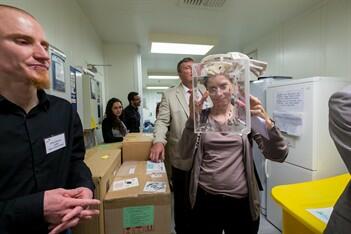
LSTM’s Vector Biology department have opened their doors to industry partners, highlighting the unique variety of work that is undertaken from the molecular level through to the development of control tools and their implementation in the field.
Guests from BASF, Sumitomo, Bayer, Vestergaard, as well as the University Training College were welcomed by Professor Alister Craig, Dean of Biological Sciences, before being shown some of LSTM’s current key areas of work by the department’s staff and students, including our involvement in the 1000 genomes projects, the development of new technology for predicting resistance, and transgenic mosquitoes. Five short presentations were then delivered providing an overview of all of the different stages of research, taking the guests on a journey from the bench to the field. Presentations covered the themes of genes, proteins, organisms, field trial and operational research as well as how barriers are overcome for the implementation of new vector control tools.
Finally the guests had the opportunity view poster presentations about the current work being undertaken by PhD students and post-doctoral staff, and a chance to talk informally to all the staff about future collaboration. Reader, Dr Mark Paine, was one of the event’s organisers. He said: “The best thing about the event was that it gave the post-doc level staff and PhD students the chance to talk informally with people that they may end up working with in the future, building on existing partnerships to foster new ones.”
Lecturer Dr David Weetman was another of the event’s organisers. He said: “We work closely with all of those who came, but we may only work on one specific element with them, so we were delighted to showcase the fact that LSTM is an organisation that leads the field in working form the very start of the process, looking at the genetic level of vectors, through to the development of control tools and their implementation and take up. All of which we do in order to benefit people from some of the most disadvantaged communities in the world.”